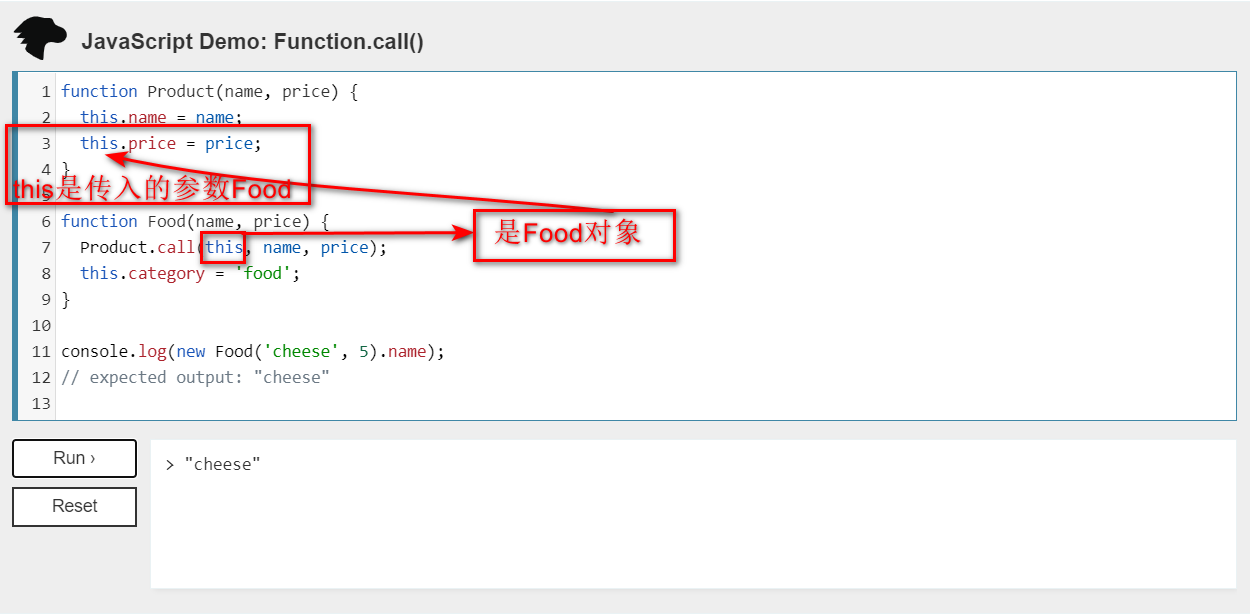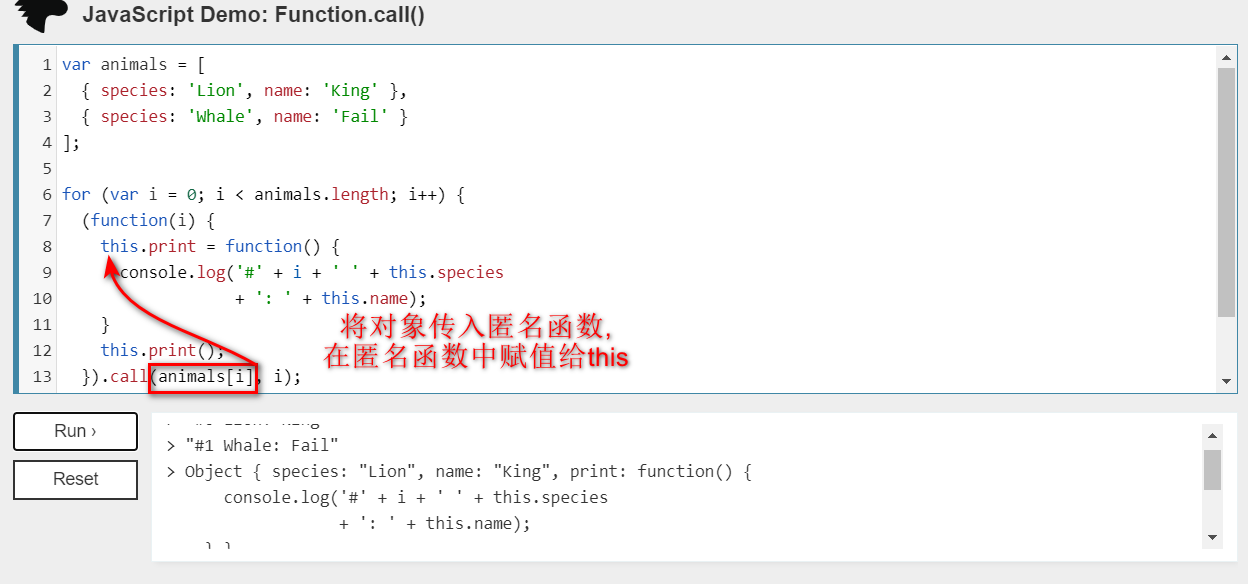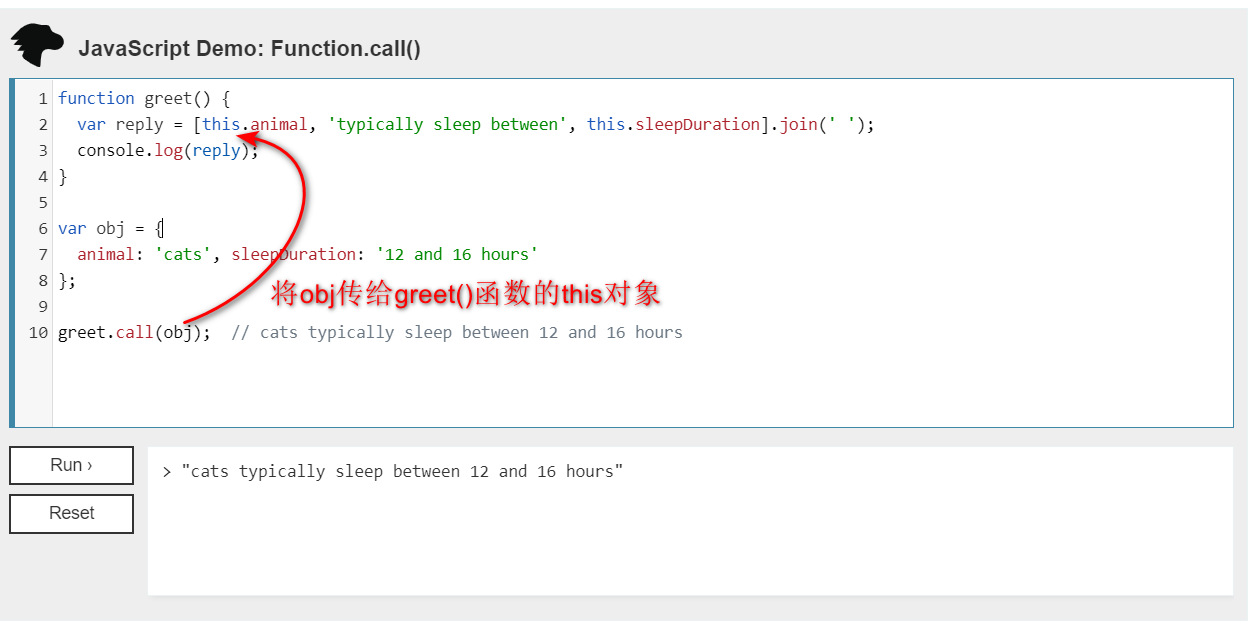构建前端第10篇之---Function.prototype.call()
张艳涛写于2020-01-25,参考:https://developer.mozilla.org/zh-CN/docs/Web/JavaScript/Reference/Global_Objects/Function/call
call() 方法使用一个指定的 this 值和单独给出的一个或多个参数来调用一个函数
语法
function.call(thisArg, arg1, arg2, ...)
参数
thisArg可选的。在 function 函数运行时使用的 this 值。请注意,this可能不是该方法看到的实际值:
如果这个函数处于非严格模式下,则指定为 null 或 undefined 时会自动替换为指向全局对象,原始值会被包装。
arg1, arg2, ...指定的参数列表。
返回值
使用调用者提供的 this 值和参数调用该函数的返回值。若该方法没有返回值,则返回 undefined。
描述
call() 允许为不同的对象分配和调用属于一个对象的函数/方法。
call() 提供新的 this 值给当前调用的函数/方法。你可以使用 call 来实现继承:写一个方法,然后让另外一个新的对象来继承它(而不是在新对象中再写一次这个方法)。
示例
使用 call 方法调用父构造函数
在一个子构造函数中,你可以通过调用父构造函数的 call 方法来实现继承,类似于 Java 中的写法。下例中,使用 Food 和 Toy 构造函数创建的对象实例都会拥有在 Product 构造函数中添加的 name 属性和 price 属性,但 category 属性是在各自的构造函数中定义的。
function Product(name, price) { this.name = name; this.price = price; } function Food(name, price) { Product.call(this, name, price); this.category = 'food'; } console.log(new Food('cheese', 5).name);
分析如下

在来看官方的第二个例子
使用 call 方法调用匿名函数
在下例中的 for 循环体内,我们创建了一个匿名函数,然后通过调用该函数的 call 方法,将每个数组元素作为指定的 this 值执行了那个匿名函数。这个匿名函数的主要目的是给每个数组元素对象添加一个 print 方法,这个 print 方法可以打印出各元素在数组中的正确索引号。当然,这里不是必须得让数组元素作为 this 值传入那个匿名函数(普通参数就可以),目的是为了演示 call 的用法。
var animals = [ { species: 'Lion', name: 'King' }, { species: 'Whale', name: 'Fail' } ]; for (var i = 0; i < animals.length; i++) { (function(i) { this.print = function() { console.log('#' + i + ' ' + this.species + ': ' + this.name); } this.print(); }).call(animals[i], i); } for (var i = 0; i < animals.length; i++) { console.log(animals[i])}
分析如下

使用 call 方法调用函数并且指定上下文的 'this'
再看第三个例子,在下面的例子中,当调用 greet 方法的时候,该方法的this值会绑定到 obj 对象。
function greet() { var reply = [this.animal, 'typically sleep between', this.sleepDuration].join(' '); console.log(reply); } var obj = { animal: 'cats', sleepDuration: '12 and 16 hours' }; greet.call(obj); // cats typically sleep between 12 and 16 hours
分析

使用 call 方法调用函数并且不指定第一个参数(argument)
在下面的例子中,我们调用了 display 方法,但并没有传递它的第一个参数。如果没有传递第一个参数,this 的值将会被绑定为全局对象。
var sData = 'Wisen'; function display() { console.log('sData value is %s ', this.sData); } display.call(); // sData value is Wisen
注意:在严格模式下,this的值将会是undefined。见下文。
'use strict'; var sData = 'Wisen'; function display() { console.log('sData value is %s ', this.sData); } display.call(); // Cannot read the property of 'sData' of undefined
实际应用
function forEach(obj, fn) {
if (isArray(obj)) { // Iterate over array values for (var i = 0, l = obj.length; i < l; i++) { fn.call(null, obj[i], i, obj); } } else { ...}
对应
utils.forEach(['delete', 'get', 'head', 'options'], function forEachMethodNoData(method) { /*eslint func-names:0*/ Axios.prototype[method] = function(url, config) { return this.request(utils.merge(config || {}, { method: method, url: url })); }; });
解析





